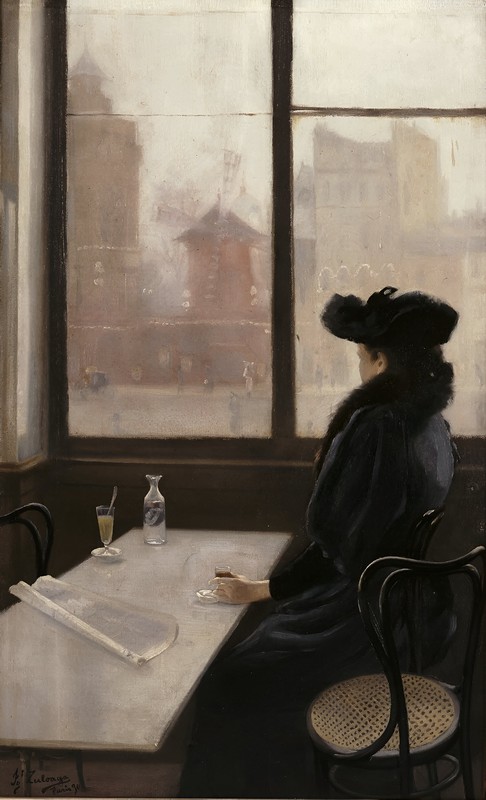
Just a few weeks after Dietrich Fischer-Dieskau was born, Nicolai Gedda, another great singer from the second half of the 20th century, was born in Stockholm on July 11, 1925.
Being very poor, the parents of Harry Gustav Nikolaj Gädda did not show him much love. The father had no interest in him, and the mother was unable and did not wish to provide for him. He was on the brink of growing up in an orphanage, but his aunt Olga, the sister of his father, prevented this by bringing the child into his home.
Some time later, Olga met Mikhail Ustinoff, a singer from the Kuban Cossack Choir, that had been reconstructed in Constantinople after many of its members had fled the Russian Revolution. Olga and Mikhail fell in love (Olga spoke Russian because her mother was Russian, that must have made things easier), they married, and adopted the child.
In 1929, Gedda's father was named music director of the Leipzig Orthodox Church, so the family moved there. The boy sang in the choir and started studying music with his father, who was proud of how talented his son was. It appears that they were good years for the family, until the Nazis came to power. The parents resolved to return to Stockholm in 1934, even if it meant once again experiencing economic hardship. Sometimes we forget that Sweden, back then, was a poor country.
Nicolai Gedda did not resume his singing studies until he was twenty-four years old. Not because he wasn't interested; quite the opposite. However, his parents were unable to afford it during his adolescence, and he later opted for "practical" studies that would enable him to aid his parents financially. He entered the workforce at a bank in 1949, following his three-year military service. After meeting his family's financial requirements, he was able to begin private singing lessons thanks to a client who introduced him to renowned tenor Carl Martin Öhman.
From there, his huge potential was revealed. The same year, in 1949, Nicolai was awarded a scholarship in a singing competition, which enabled him to concentrate on his studies without financial concerns. He had a successful debut at the Stockholm Opera in 1952, which is how music producer Walter Legge heard about him. He was so amazed that he sent Herbert von Karajan a telegram to tell him that he had found a wonderful Mozartian tenor. Karajan invited Nicolai to an audition; the young man left with a contract under his arm, and the next year he made his debut at La Scala in Milan. Nicolai Gedda had become a tenor that everyone wanted.
Much has been said about the tenor’s impressive operatic career, about the more than fifty roles he played and about the countless recordings. However, as is often the case, not much is said about his work as a song singer. Even worse, it is occasionally mentioned, but only by wiping the nose slightly, arguing that his voice was too large to sing Art Song. As an answer to this argument, I just can raise an eyebrow and suggest that you listen to one of the ten songs that he has already sung on Liederabend. Or to the one I suggest this week, Zabit tak skoro (Forget it so soon).
Unlike his customary practice of composing and publishing six-in-six songs, Tchaikovsky composed this song as a standalone piece. He did so in October or November 1870, upon a poem of his friend Aleksei Apukhtin, apparently to being performed in March 1871 at a concert in Moscow with only his own music. Zabit tak skoro was published in a magazine in 1870, and was re-published in 1873, but it seems that without Tchaikovsky's intervention, and without opus number (in the recordings we find it as TH 94 or as ČW 217 according to the two catalogues of the composer). We will listen to Nicolai Gedda singing this beautiful song with his usual elegance, accompanied by Erik Werba in a live recording.
Zabit tak skoro, Boje moi,
Vsió stxastie jizni projitoi!
Vse naixi vstretxi, razgovori,
Zabit tak skoro, zabit tak skoro!
Zabit volnenia pervikh dnei,
Svidania txas v teni vetvei,
Otxei nemie razgovori,
Zabit tak skoro, zabit tak skoro!
Zabit, kak polnaia luna
Na nas gliadela iz okna,
Kak kolikhalas tikho xtora...
Zabit tak skoro, zabit tak skoro!
Zabit liubov, zabit metxti,
Zabit te kliatvi -- pomnix ti?
V notxnuiu pasmurnuiu poru?
Zabit tak skoro, tak skoro!
Boje moi!
Please follow this link if you need an English translation













